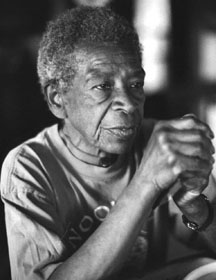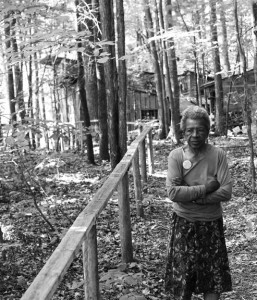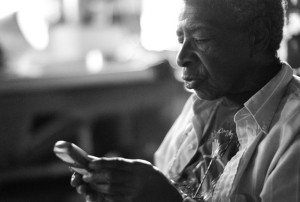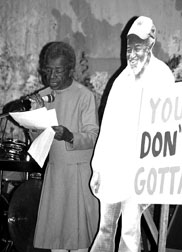Juanita Morrow Nelson
August 17, 1923 – March 9, 2015
A celebration of Juanita’s life was held on May 30, 2015. The Greenfield Recorder reported on the event.
See more about the memorial at the Appreciations (below)
Outhouse Blues by Juanita
A Matter of Freedom by Juanita
On Interest by Juanita
A short profile of herself on her war tax resistance
 GREENFIELD—Juanita (Morrow) Nelson, 91, died peacefully following a period of declining health on Monday, March 9, 2015, at Poet’s Seat Health Care Center in Greenfield, Massachusetts.
GREENFIELD—Juanita (Morrow) Nelson, 91, died peacefully following a period of declining health on Monday, March 9, 2015, at Poet’s Seat Health Care Center in Greenfield, Massachusetts.
Heralded as a lifelong activist and pioneer of the Civil Rights Movement and the organic farming and simple living movements, Juanita was born in Cleveland, Ohio, on August 17, 1923, the daughter of Eula Jean (Middlebrooks) Morrow and Oscar Morrow, Sr.
Juanita graduated in 1941 from Cleveland’s Central High School and attended Howard University in Washington, D.C. She served as secretary of the university’s NAACP (National Association for the Advancement of Colored People) and experienced her first arrest for civil disobedience while protesting lunch counter segregation in our nation’s capitol. In 1943, she enrolled in Western Reserve University, majoring in journalism, and worked as a reporter for the Cleveland Call & Post. In that role, she met her lifelong partner, Wally Nelson, while working on a story about segregated conditions in the jail in which Wally was awaiting trial as a conscientious objector.
Juanita worked with CORE (Congress of Racial Equality) on both local and national levels. In 1948, Wally and Juanita refused to pay taxes for war and military preparations and helped found Peacemakers, a pacifist group that took its name from the biblical Beatitudes: “Blessed are the peacemakers….” The group advocated non-payment of federal war taxes, non-registration for the military draft, and the promotion of nonviolence in all areas of life.

Juanita at Woolman Hill, September 2007. The house she shared for many years with Wally is in the background. Photo by Ed Hedemann.
In 1950, the Nelsons became part of an integrated household in Cincinnati, Ohio, which led to tensions within a neighborhood where segregation was the norm. In 1955, Juanita earned a degree in speech pathology from Ohio State University, motivated by the fact that this would allow her to work on a contractual basis without withholding taxes.
The Nelsons moved to Philadelphia in 1956 and lived in Powelton Village, a culturally diverse and historic neighborhood. They spent four months at Koinonia Farm in Americus, Georgia, which had come under attack for refusal to discriminate based on skin color. Shots were fired into the community during the Nelsons’ stay. In the late 1960s and early 1970s, Juanita was arrested several times due to activities connected with tax resistance and civil rights protests.
With Wally, Juanita began her farming life in 1970 when they moved to Ojo Caliente in northern New Mexico. Fueled by a desire to live more simply in the face of U.S. war in Vietnam and to be less involved in the economic milieu that spawns war, they made their living by growing and selling produce and attempting to become as self-sufficient as possible. They learned to heat and cook with wood, preserve food, and make their own soap.
Their 1974 move to Woolman Hill, site of a Quaker conference center in Deerfield, MA, brought theNelsons to the Pioneer Valley, where they became mentors to many people, young and old. Granted lifetime use of a small plot of land, the Nelsons built a compact home with no electricity or running water and received permission from the town to build an outhouse.
Juanita authored many articles and poems, as well as the 1988 book, A Matter of Freedom. She and Wally helped found the Valley Community Land Trust, Pioneer Valley War Tax Resisters, and the Greenfield Farmers’ Market. After Wally’s death in 2002, Juanita hatched the idea for the Free Harvest Supper, held in Greenfield, which has become a major community event in late August of each year.
A longtime advocate of local food, Juanita challenged attendees at the 2006 Free Harvest Supper to eat locally, not just when it was convenient but year round. This challenge spawned Winter Fare, the first winter farmers market in Massachusetts. The idea soon spread throughout the Commonwealth.
For the last several years, Juanita lived with a series of close friends, including Eveline MacDougall, Ellie Kastanopolous, and, most recently, Betsy Corner, Randy Kehler, and Kip Moeller.
Juanita was pre-deceased by her partner Wally Nelson and her brothers Charles Morrow and Oscar Morrow, Jr. She is survived by many nieces, nephews, and cousins in Ohio, and by a large national and international family of friends and fellow travelers. She will be sorely missed by many.
End-of-life arrangements are being handled by the Eternal Blessings Cremation Service in Guilford, Vermont.
Memorial donations may be sent to the Valley Community Land Trust, Box 1552, Greenfield, MA 01302, and to the Wally and Juanita Nelson Scholarship Fund at Greenfield Community College, c/o GCC Foundation, 270 Main Street, Greenfield, MA 01301.
—————-
A celebration of the amazing and inspiring life of our dear friend Juanita Nelson was held on Saturday, May 30, in Greenfield, Massachusetts. The local newspaper ran a story with a video after the event.
Appreciations
Ruth Benn, Brooklyn, New York — “Reflection” given at the May 30 memorial:
For the first couple years I lived in NYC I wasn’t much in touch with people up here. Then in 1987, I started working at War Resisters League, and the WTR program was part of my job. It put me back in touch with activists here and around the country and of course you couldn’t be in the war tax resistance movement and not talk about and hear about and communicate with Wally and Juanita.
Along with Earnest and Marian Bromley and Maurcie McCrackin, they are the founders of the “modern WTR movement” –beginning during WWII. The Peacemaker philosophy of taking personal responsibility to resist the war machine, their activism, and their resources are the foundation on which all of us in WTR stand.

Many of you were at this historic New England Gathering of War Tax Resisters in 1991 when the 5 founders were together for the last time. (Photo by Ed Hedemann)
Those gatherings were so important to Juanita as another part of building community – a community of resistance. Some of the discussion at those gatherings would have to do with personal actions vs. organizing, and an ongoing argument with Juanita was that she didn’t like to call herself an organizer. She’d say, “I can’t make anybody do anything. The big thing is that I do what I can and what I believe.”
But she was the one who kept a stock of WRL’s Guide to War Tax Resistance, the WRL pie chart, and pamphlets and booklets from National War Tax Resistance. Working for both organizations I always looked forward to the notes that came with her orders.
She came to national meetings off and on — in fact she was at the founding conference of the National War Tax Resistance Coordinating Committee in 1982 (as were Wally and Ernest and Marion). She spoke on panels and workshops at the International Gathering of WTR and Peace Tax Campaigns in DC in 2000. She submitted local reports and wrote for our newsletters and booklets.
I still think one of her most interesting pieces is her argument against interest. She writes that she experimented with a jar of pennies to see if it has reproductive powers. She suggests watching a jar of 100 pennies on your desk to see if it after a few days there are 101 pennies, 110, and so on. She concluded that money does not have reproductive powers and that earning interest must come off the back of someone else. The arguments that Pioneer Valley WTR had about where to put their money made quite an impression on me.
In an interview, Juanita talked about how she knew early on that she would not have a traditional career because refusing to pay for war was so important to her. This was just a matter-of-fact statement for her. To me it was like a light bulb went off. Juanita’s clarity about her choices have really helped to line up my thinking about my own choices.
Over the last decade or so of visiting Juanita, she always asked what was going on around the country with war tax resistance. “Are there any new people?” she’d ask. Despite this age of endless war, I was not able to present evidence of mass resistance. In recent years with her memory loss when she saw me that was the question she asked over and over. “Are there any new people?”
So if any of you want to fulfill Juanita’s hope and join us, I’ll leave you with a few of her words about war tax resistance from an interview for our film “Death and Taxes.” She said –
“It isn’t a painful thing. It’s sort of trying to take charge of your own life.
It’s been very joyous in a way. An adventure.
Got a lot of stories to tell too.”
******
Bob Bady, Brattleboro, Vermont:
When I was 18 and first met Wally and Nita Nelson, I was impressed by their integration of lifestyle and politics. The personal is political. It’s reflected through your relationships with your parents, children, cops, whatever. Since many of my activist friends from high school were already burnt out, these “old people” with their philosophical and personal consistency were a guiding light.
Nita was always thinking about economics on this personal level. She felt that the power dynamics that enabled a few people to have more than they needed, while most have not enough, creates much of the violence in the world. Typically she took this issue down to the personal. I remember her once commentating in a small group that most of us are more willing to disclose the details of our sexual lives than to talk frankly about our personal finances. Nita grew up in a poor family, led by her mother and aunts in Cleveland during the depression. She talked about how oblivious they were to the depression because they were always so poor. They simply shared whatever they had and relied on each other. That was her model of a just, nonviolent world.
******
Karl Meyer, Nashville, Tennessee:
I knew Juanita and Wally as highly valued friends and mentors since 1959, when I first met them at Peacemakers gatherings in Cincinnati. Among all the fine humans I have had the good fortune to know in a long life of social justice activism, they stood out among those of the very highest integrity and moral consistency in personal and public life. They had great influence on me at two important junctures in my life:
I was already committed to the idea of war tax refusal before I met them (under the influence of Milton Mayer and Ammon Hennacy), but it was not until 1960, inspired by the example of Eroseanna Robinson who had gotten her whole philosophy of war tax refusal and prison resistance from her friends Juanita and Wally, that I decisively acted to refuse payment of all federal income tax claims, to stop filing tax returns, and to effectively prevent collection of any claimed amounts, practices I have followed for the 55 years since then.
Again, in the early nineties, when I visited their simple homestead and market garden in Deerfield, Massachusetts, the example of their radically honest and simple way of life deeply influenced my decision to settle on unused land in inner-city Nashville in 1997, starting the Nashville Greenlands community devoted to urban agriculture, simple sustainable living, and radical action of peace and social justice.
So many of the nonviolent radicals of my generation learned so much from Juanita and Wally.
**************
Ed Hedemann, Brooklyn, New York:
 “Why do you need all this?!” Juanita asked me. She was referring to the high-end camera equipment that I was using to photograph her and others more than 30 years ago at a NWTRCC conference in Boston. She was, of course, being true to her simple-living philosophy. Years later when figuring out one’s carbon footprint was all the rage, not surprisingly Juanita’s turned out to be dramatically lower than that of her nearest “competitor” (though not zero, as one might think).
“Why do you need all this?!” Juanita asked me. She was referring to the high-end camera equipment that I was using to photograph her and others more than 30 years ago at a NWTRCC conference in Boston. She was, of course, being true to her simple-living philosophy. Years later when figuring out one’s carbon footprint was all the rage, not surprisingly Juanita’s turned out to be dramatically lower than that of her nearest “competitor” (though not zero, as one might think).
It was such that many friends used to kid her and Wally about their disdain for modern technology. As a prank, long-time friend Chuck Matthei (I think it was he) surreptitiously left a cellphone (though a non-working one) in their decidedly no frills cabin as a response to withering remarks she had made about never owning such a thing. Juanita with her life and with her resistance set a standard that showed what was possible. And, perhaps as importantly, she did it with humor.
*******
Lori Barg, Plainfield, Vermont:
I will always remember their garlic, Juanita and Wally dancing around the cabin-to Sweet Honey in the Rock on a Sunday morning, ginger ice-cream, cornbread, pie. They both exemplified what it means to be a human being and to live true to your values.
*****
Ed Agro, Randolph, Massachusetts:
I met Wally and Juanita way back in the days when the propagation of war tax refusal and rational lifestyles was by way of the hard-copy Peacemaker. Wally could be, well, doctrinaire; whenever we met I looked forward to a vigorous debate. With Juanita, each conversation began and ended with hugs and smiles. I learned a lot from both of them, and miss them both.
Juanita’s Wisdom
By Ginny S., Henniker, New Hampshire
Other than being one of the modern-day founders of the War Tax Resistance “Movement,” Juanita Nelson was my best friend and a woman who has influenced my life. I met Wally and Juanita in 1993 when I moved from New York City to Western Massachusetts. I had become a war tax resister in 1985 as a result of the peace work I volunteered to do to get the US out of El Salvador. When I moved to Western Massachusetts, I immediately sought out peace people and Juanita was one of them…maybe the first one I encountered. Several years later, I moved closer to Deerfield, where Wally and Juanita lived. I asked them if I could help out at The Bean Patch, their market garden located on Woolman Hill, and learn how to farm. They graciously obliged.
Once a week, I came to Deerfield and weeded, planted, hauled manure and pruned mostly with Juanita While working and talking with her for eight or more hours each week, I discovered we shared many views: no god, no war, simplify, simplify, simplify. Her strategy was to tackle one act of increased simplicity every year, a practice I try to follow as well.
Juanita also shared her reading list with me. Two books included: Interest and Inflation Free Money by Margrit Kennedy (free online at http://www.margritkennedy.com/books.html) and US Representative John Lewis’ book Walking with the Wind: A Memoire of the Movement. Both Juanita and Kennedy influenced me to begin an interest-free life that is not based on speculation.
Through Wally and Juanita, I met a whole host of brilliant people including their surrogate son Chuck Matthei. The story was that Chuck adopted Wally and Juanita when he was 18. Somehow he found his way from Chicago to Philadelphia, where they were living at the time. He went on to resurrect the Institute for Community Economics which worked nationally to encourage community land trusts. Later, he founded Equity Trust (equitytrust.org) which supports community land trusts and creates affordable farms in perpetuity. Chuck became a national treasure on land tenure and sustainable communities. He helped establish community loan funds across the US. Certainly, the Nelson’s vision of society, community and economics including speculation and interest moved Chuck in the direction he took, and helped to spawn the movement to build the future that we want to see.
Juanita was an organizer and public speaker. She took every opportunity to talk with people who travelled from near and far to The Bean Patch. She spoke at universities, high schools and other venues. Her voice was strong, sure and elegant (a word she would probably dispute). She also brought together war tax resisters and those thinking about war tax resistance at monthly potlucks for years. When she found out I was moving to New Hampshire, she instructed me to do the same. Juanita had many great ideas. She thought war tax resisters should have an exhibit about war tax resistance and is the one who put the bee in my bonnet to create the exhibit more than 10 years ago.
Periodically, we discussed surveillance. Juanita’s thinking was that the people watching us might be transformed and she welcomed the suspected ones into our midst. I think she was right. When I travelled to El Salvador with delegation, a member of the trip who I thought was an agent, truly seemed to change as he was exposed to injustice and the struggles of the people in that country.
Juanita often quoted the writer Toni Cade Bambara who said her role was to make the “revolution irresistible.” Juanita certainly did that and the proof is in the struggle and social change we take on in our daily lives as a result of her inspiration.
Juanita’s old profile from our Speakers’ Bureau page:
 I became a dedicated war tax refuser in 1948, the year Wally Nelson and I became partners. I could not support the military so directly when Wally had just spend over three years in prison for saying No to that form of organized crime. We joined the newly formed Peacemakers which had as a major tenet nonpayment of federal taxes.
I became a dedicated war tax refuser in 1948, the year Wally Nelson and I became partners. I could not support the military so directly when Wally had just spend over three years in prison for saying No to that form of organized crime. We joined the newly formed Peacemakers which had as a major tenet nonpayment of federal taxes.
I found part-time jobs which paid the maximum nontaxable income. Wally did odd jobs with no withholding. I was therefore able to claim him as a dependent, permitting me to earn $50 a week at that time.
Because my employers reported my income, the IRS finally caught up with me after 11 years. I was arrested in only my terry cloth bathrobe for refusing to give information. (IRS agents sometimes keep early hours.)
On one of my odd jobs – artists’ model at the Cincinnati Art Museum – four dollars were mistakenly turned over to the IRS. I rather regretted that, but decided not to worry about it. Makes a good story.
Wally and I left city living in 1970, part of an effort to lessen dependence on a violent society. We spent over three years in a village of 500 in northern New Mexico with electricity as our only modern convenience. In 1974, we moved to Woolman Hill, a Quaker Conference Center in Western Massachusetts, built a 900-square-foot home with most of the material coming form a small house we dismantled.
Wally died in 2002, but I continue growing most of my food, cooking and heating with wood, drawing water hand over hand from a too deep well, have only two propane gas lights and probably the only certified outhouse in Franklin County. I manage with lots of help from friends much younger.
Outhouse Blues
By Juanita Nelson
Well, I went out to the country to live the simple life,
Get away form all that concrete and avoid some of that strife,
Get off the backs of poor folks, stop supporting Uncle Sam
In all that stuff he’s puttin’ down, like bombing Vietnam
Oh, but it ain’t easy, ’specially on a chilly night
When I beat it to the outhouse with my trusty dim flashlight —
The seat is absolutely frigid, not a BTU of heat…
That’s when I think the simple life is not for us elite.
Well, I try to grow my own food, competing with the bugs,
I even make my own soap and my own ceramic mugs.
I figure that the less I buy, the less I compromise
With Standard Oil and ITT and those other gouging guys.
Oh, but it ain’t easy to leave my cozy bed
To make it with my flashlight to that air-conditioned shed
When the seat’s so cold it takes away that freedom ecstasy,
That’s when I fear the simple life maybe wasn’t meant for me.
Well, I cook my food on a wood stove and heat with wood also,
Though when my parents left the South I said, “This has got to go,”
But I figure that the best way to say all folks are my kin
Is try to live so I don’t take nobody’s pound of skin.
Oh, but it ain’t easy, when it’s rainy and there’s mud
To put on my old bathrobe and walk out in that crud;
I look out through the open door and see a distant star
And sometimes think this simple life is taking things too far.
But then I get to thinkin’, if we’re ever gonna see
The end of that old con game the change has got to start with me.
Quit wheelin’ and quit dealin’ to be a leader in any band,
And it appears the best way is to get back to the land.
If I produce my own needs I know what’s goin’ down,
I’m not quite so footsy with those Wall Street pimps in town.
’Cause let me tell you something, though it may not be good news,
If some folks win you better know somebody’s got to lose.
So I guess I’ll have to cast my lot with those who’re optin’ out.
And even though on freezing nights I will have my naggin’ doubts,
Long as I talk the line I do and spout my way out views
I’ll keep on usin’ the outhouse and singin’ the outhouse blues.
